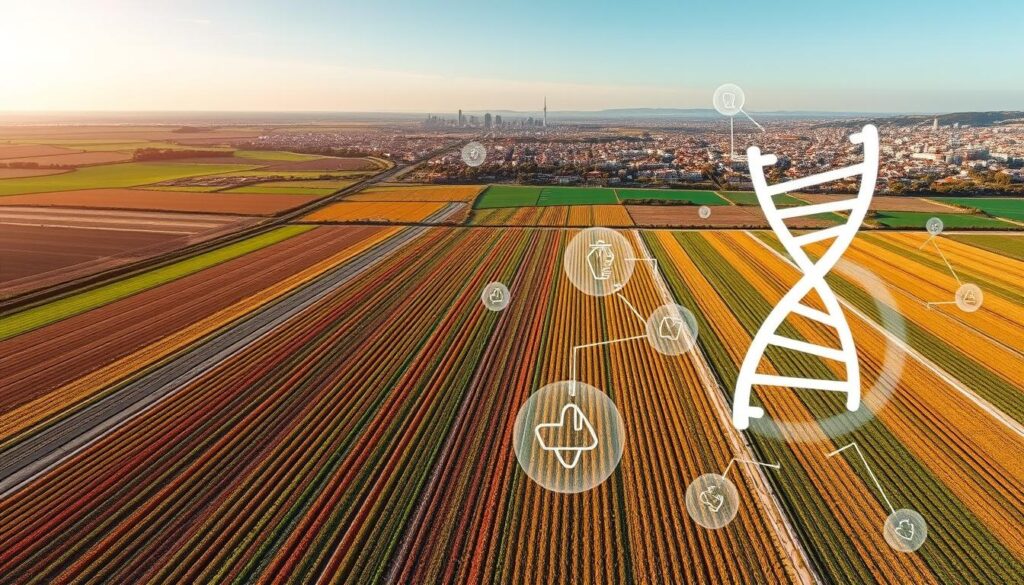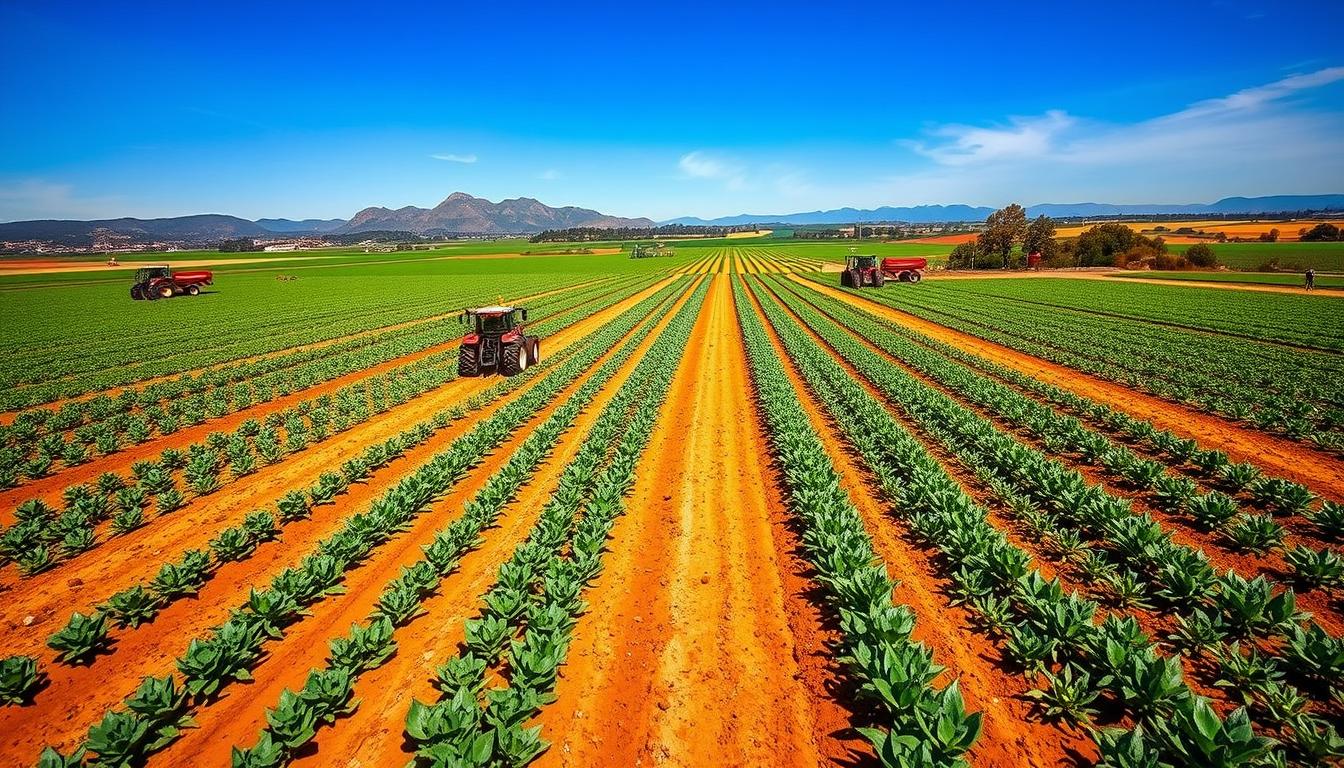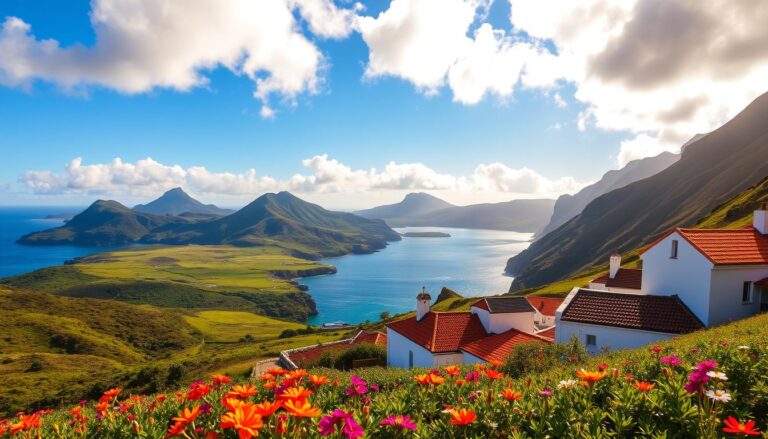Monsanto in Portugal: Insights into the Agribusiness Giant
When you first step into Portugal’s green fields, you might not see Monsanto’s big impact. Since 1901, Monsanto has grown from a chemical company to a global leader in farming. It has deeply influenced Portugal’s agriculture.
Exploring Monsanto in Portugal, you’ll see its amazing change. The company’s history in Portugal shows how it moved from making chemicals to leading in biotechnology and farming innovation.
Monsanto has changed farming in Portugal. It brought in genetically engineered crops for better yields and stronger farming. Its work in Portugal shows how technology can make farming more sustainable.
Looking into Monsanto’s story in Portugal, you’ll learn about its journey. It has faced tough rules, created new technologies, and helped modernize farming in Portugal. Monsanto’s work in Portugal is about changing farming for the future.
This article will take you into the world of Monsanto’s work, challenges, and achievements in Portugal. You’ll see how Monsanto has made a big difference in farming here. Get ready for insights that go beyond usual farming stories.
Table of Contents
Overview of Monsanto’s Presence in Portugal
Monsanto’s journey in Portugal is filled with innovation and growth. The company has made a big impact on the country’s farming. This has changed the way farming is done in Portugal.
Monsanto first came to Portugal in a big move. The Monsanto Portugal map shows where they are. It shows how they cover the whole area with their farming work.
Brief History of Monsanto’s Operations
Monsanto came to Europe in 1919. They quickly made a big difference in farming. Their work in Portugal grew with new plans and technology.
- Established European operations in early 20th century
- Developed strategic agricultural infrastructure
- Integrated advanced biotechnology techniques
Key Facilities and Locations
The Monsanto Portugal map points out key places. These are important for research, development, and making products.
| Location | Facility Type | Primary Function |
|---|---|---|
| Lisbon Region | Research Center | Biotechnology Innovation |
| Alentejo | Crop Development Station | Seed Research |
| Porto | Distribution Hub | Agricultural Supply Chain |
Learning about Monsanto in Portugal shows their dedication to better farming. They focus on farming that is good for the planet.
The Role of Monsanto in Portuguese Agriculture
Monsanto has changed Portuguese farming, mixing old ways with new tech. They’ve made special crops and teamed up with farmers. This has changed the way farming looks in Portugal.
- Developing drought-resistant crop varieties
- Introducing advanced seed technologies
- Supporting sustainable farming practices
Crop Varieties Developed by Monsanto
Monsanto’s work has helped farming fit Portugal’s climate. They’ve made specialized seed varieties that grow well in Portugal’s varied lands. This includes the coast and mountains like the Serra da Estrela.
Partnerships with Local Farmers
Monsanto and farmers working together has boosted farming. They share knowledge and bring new methods to old farming ways.
Local restaurants in Portugal also gain from these changes. Better crops mean tastier food. Monsanto’s work has a big impact on food in Portugal.
Monsanto keeps pushing for better farming and working with locals. They help grow the economy in rural areas.
Innovations Introduced by Monsanto in Portugal
Monsanto has been a leader in agricultural innovation in Portugal. It has changed farming with new technologies. The company works hard to make farming better and more sustainable.
Advancement in Biotechnology
Monsanto has led in biotechnology in farming. They have made genetically modified organisms (GMOs) to improve crops. Their work has led to:
- Crops that yield up to 20% more
- Plants that resist pests better
- A 30% drop in pesticide use
- Better overall farming results
Sustainable Agricultural Practices
Monsanto also focuses on sustainable farming in Portugal. They have spent over €11 million on research. This helps local farmers and supports green farming methods.
| Innovation Area | Impact in Portugal |
|---|---|
| Crop Biotechnology | 5% of cultivated corn and cotton areas |
| Farmer Training | 1,500 stakeholders trained annually |
| Economic Contribution | €100 million annual sector impact |
| Biodiversity Support | 40% increase in beneficial insect populations |
Accommodation near Monsanto’s research sites has grown too. This shows Monsanto’s big role in Portuguese farming. Their work shows their dedication to sustainable farming in Portugal.
Regulatory Environment for Monsanto in Portugal
Understanding the complex rules is key for companies in Portugal’s agriculture. At Monsanto portugal, you’ll see a detailed setup of policies and EU rules guiding their work.

Monsanto in Portugal faces many rules and checks. Knowing these rules helps you see how the company plans for farming’s future.
Overview of Agricultural Policies
Portugal’s farming policies cover important areas for Monsanto:
- Sustainable farming practices
- Environmental conservation
- Genetic modification rules
- Land use limits
Compliance with European Union Regulations
Monsanto must follow strict EU rules, including:
- Tight biotechnology rules
- Deep environmental checks
- Clear reporting systems
- Standards for chemicals and seeds
At Monsanto portugal, you’ll see a focus on high standards and innovation. They balance new tech with following the rules, shaping their farming plans.
Controversies and Challenges Faced by Monsanto
Monsanto’s journey in Portugal has been filled with hurdles. The company has faced tough legal and environmental battles. These have shaped its image and work in the area.
The debates about Monsanto Portugal have focused on several key points:
- Genetic modification of crops near the historic Monsanto castle region
- Environmental impact assessments
- Public perception of biotechnology
- Regulatory compliance
Legal Issues and Public Perception
Legal problems have come from Monsanto’s farming methods. The use of MON810 transgenic maize, covering about 4,321 hectares in 2021, sparked a lot of debate. People have mixed feelings, worried about the impact on nature.
Environmental Concerns and Responses
Monitoring the environment is crucial for Monsanto. The European Food Safety Authority (EFSA) has suggested looking into how genes might move and affect the environment.
| Year | MON810 Hectares in Portugal | Key Concerns |
|---|---|---|
| 2021 | 4,321 | Teosinte spread, protein transfer |
| 2022 | Declining | Genetic mutation risks |
| 2023 | Projected reduction | Biosafety protocols |
Despite the hurdles, Monsanto believes its methods help crops grow better and farming become more sustainable. The company keeps talking to local people to clear up doubts and show it’s serious about good farming.
Economic Impact of Monsanto in Portugal
Monsanto’s presence in Portugal is a big deal for the economy. It changes how farming works in the area. The company helps grow the economy and offers jobs to local people.
Understanding Monsanto’s impact starts with seeing how it creates jobs. It plays a big role in helping Portuguese farming grow. Monsanto supports farming in many ways.
Contribution to Local Economies
Monsanto’s effect on Portugal’s economy goes beyond just farming. It helps in several important ways:
- Creating jobs in farming
- Helping rural areas grow
- Building local infrastructure
- Encouraging new farming technologies
Employment Opportunities Created
Monsanto has brought a lot of jobs to Portugal. There are many different types of jobs available:
| Employment Category | Estimated Jobs Created |
|---|---|
| Direct Agricultural Jobs | 500-750 positions |
| Research and Development | 100-150 specialized roles |
| Support and Administrative | 200-300 positions |
These jobs not only help the economy but also improve farming skills. Monsanto’s focus on local jobs shows its commitment to Portugal’s growth.
Community Engagement and Corporate Responsibility
Monsanto Portugal is dedicated to helping communities through various initiatives. They focus on education and partnerships to make a real difference. This approach helps tackle big challenges in agriculture and society.
The company goes beyond just doing business. It aims for sustainable growth and empowering local people.
Educational Initiatives and Capacity Building
Monsanto Portugal has started many educational programs. These programs help farmers and those in agriculture. They cover:
- Advanced farming techniques
- Sustainable agricultural practices
- Water conservation strategies
- Technology integration in agriculture
Collaborations with NGOs and Local Groups
Monsanto Portugal works with local groups to tackle big issues. They team up to improve agriculture and community life.
| Partnership Focus | Key Objectives | Impact |
|---|---|---|
| Water Conservation | Reducing agricultural water consumption | Potential 25% water usage reduction |
| Sustainable Farming | Implementing eco-friendly practices | Improved soil health and crop yield |
| Community Education | Training local farmers | Enhanced agricultural knowledge |
Monsanto Portugal tackles big issues like water scarcity and sustainable farming. Their efforts support local communities and push for new ways in farming.
Monsanto’s Research and Development Efforts
Monsanto has always been at the forefront of agricultural innovation in Portugal. The company has been working hard to develop new technologies for farmers in Portugal and around the world.

At the core of Monsanto’s efforts in Portugal are several key areas. These areas help push agricultural technology forward:
- Advanced crop biotechnology
- Sustainable agricultural solutions
- Genetic crop improvement
- Climate-resistant plant varieties
Focus Areas in Agricultural Technology
Monsanto has put a lot of money into developing new technologies for Portuguese farmers. Monsanto Portugal history shows their commitment to making crops that can grow well in tough conditions.
Some of the main research projects include:
- Creating crops that can handle drought
- Improving the nutrition of common crops
- Developing plants that can fight off pests
Outcomes of Research Programs
Monsanto’s research has led to big successes. The company has made crops that grow better and are more resilient. This helps Portuguese farmers grow more food.
Recent data shows the success of their research:
- 11% increase in crop protection volume
- 4% rise in seed prices due to new technology
- Creating crops that can handle different climates
Monsanto’s focus on new agricultural technologies is changing Portugal’s farming scene. They support local farmers and help feed people all over the world.
Future Prospects for Monsanto in Portugal
Monsanto is at a key moment in Portugal’s farming world. The company’s plans are influenced by changing markets and new technologies. These changes could greatly improve local farming.
The Bayer acquisition in 2018 has changed Monsanto’s strategy in Portugal. Expect big changes in the next few years:
- Advanced biotechnology investments targeting crop resilience
- Sustainable agricultural practice implementation
- Enhanced partnerships with local Portuguese farmers
- Innovative technologies supporting restaurant supply chains
Planned Investments and Initiatives
Monsanto Portugal is working on new projects to boost farming. They are focusing on:
- Research and development of drought-resistant crop varieties
- Digital farming technologies
- Precision agriculture tools
Potential Market Trends and Challenges
The company sees challenges like adapting to climate change and new rules. Restaurants and farms will need to work with Monsanto to face these issues.
Monsanto is using the latest tech and building strong local ties. This makes them a key player in Portugal’s farming future.
Comparison with Other Agribusinesses in Portugal
Monsanto is a key player in Portugal’s agriculture. It stands out because of its focus on innovation. This sets it apart from other companies.
To understand Monsanto’s place in the market, we need to look at its strategies. Portugal’s agriculture is competitive, with many companies trying to make their mark.
Market Share Analysis
Monsanto is known worldwide for its agricultural technology. What makes it unique in Portugal includes:
- Advanced biotechnology research
- Strong partnerships with farmers
- Investment in sustainable farming
- Innovative crop development
Competitive Strategies
Monsanto in Portugal focuses on technology and sustainability. It stands out because of:
- Precision agriculture tech
- Research and development
- Partnerships with local institutions
While others stick to old farming ways, Monsanto uses biotechnology. This makes crops more resilient and productive. It has made Monsanto a leader in innovation in Portugal.
Monsanto’s commitment to change farming through technology and partnerships is clear. It shows in the competitive landscape.
Monsanto and Global Agricultural Trends
The world of farming is changing fast, with Monsanto leading the way in sustainable farming. By visiting Monsanto Portugal, you’ll see how the company links Portugal’s farms to markets worldwide.
At Monsanto Portugal, you’ll see a leader in farming innovation. The global market for farm chemicals is expected to grow. It will go from USD 235.2 billion in 2023 to USD 282.2 billion by 2028, growing 3.7% each year.
Connection to International Markets
Monsanto has a smart plan for reaching markets around the world. They use:
- Advanced precision farming tools
- Crop varieties for different places
- The “4Rs” for better nutrient use
Influence on Sustainable Practices Worldwide
Monsanto is all in on sustainable farming. They use new tech to make farming better everywhere.
| Global Agricultural Innovation Focus | Impact |
|---|---|
| Precision Farming Tools | More crops and better use of resources |
| AI-Driven Analytics | Better use of fertilizer and water |
| Sustainable Crop Development | Deals better with climate changes |
The need for green and efficient farming is driving new tech. Visit Monsanto Portugal to see how these trends are changing farming here.
Conclusion: The Legacy of Monsanto in Portugal
Exploring Monsanto’s impact in Portugal shows a mix of innovation and challenges. The company has made big strides in farming technology and helped local farmers. A Monsanto Portugal map would show how far-reaching its influence is across the country.
Monsanto’s legacy goes beyond just technology. It’s about how the company worked with farmers, research groups, and government. The Monsanto Portugal map highlights its strategic spots in key farming areas. These areas are changing due to urban growth.
Summary of Key Insights
Monsanto has changed farming in Portugal with new biotech solutions. These changes have been big in areas where people are moving to cities. Now, about two-thirds of Portugal’s people live in cities, changing how farming works.
The Path Forward for Monsanto in the Region
Monsanto has both chances and hurdles ahead in Portugal. The future will need more focus on green farming, new tech, and working with local people. Understanding Monsanto’s path means seeing the balance between growing farming and protecting the environment.







